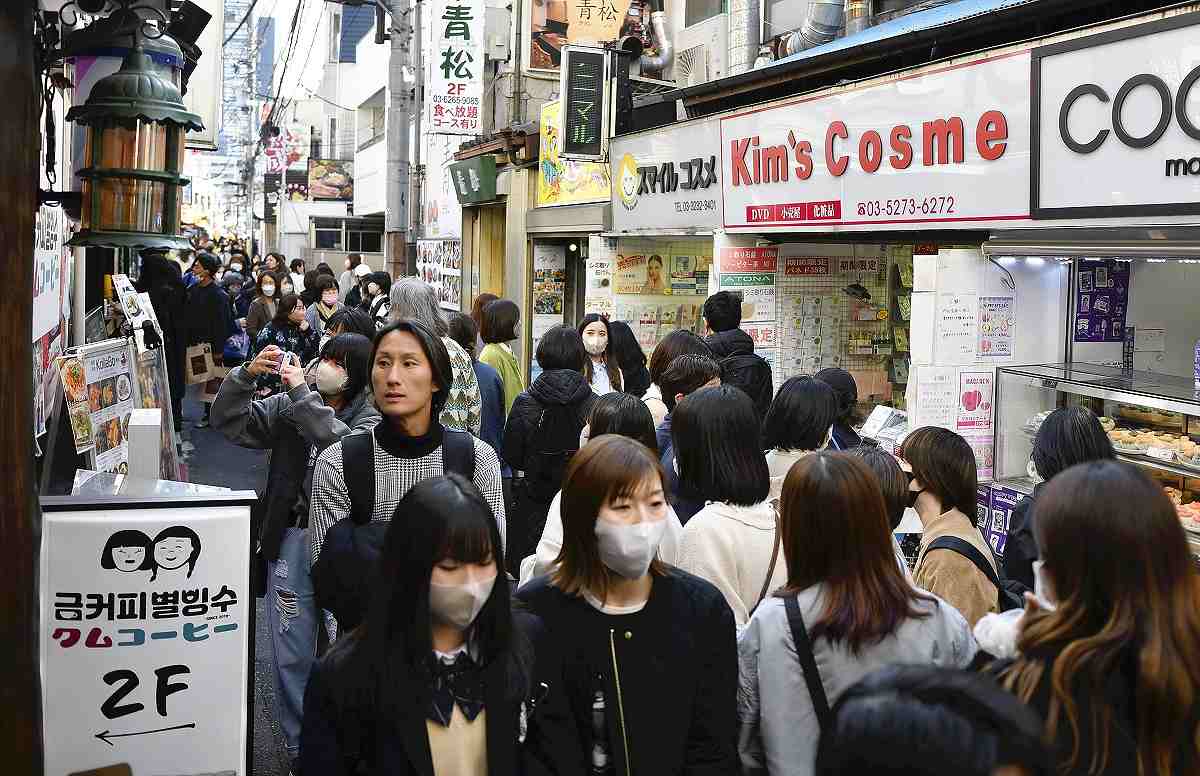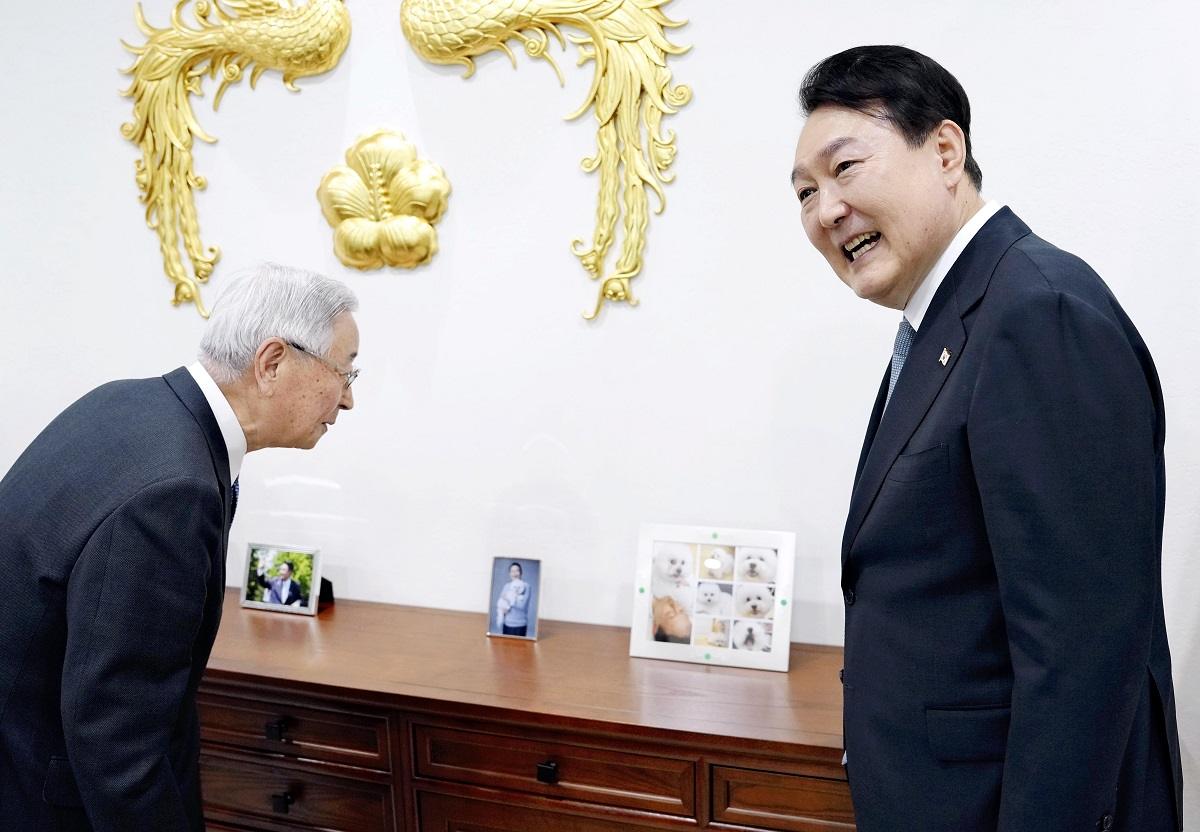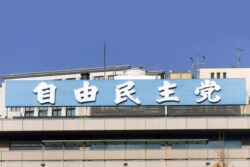
The Shin-Okubo district of Shinjuku Ward, Tokyo, bustles with visitors on Tuesday.
17:47 JST, March 15, 2023
Japan tightened controls in July 2019 on the export of three items to South Korea, including hydrogen fluoride, which is used in the semiconductor cleaning process. This led to the further spread in South Korea of a campaign to boycott Japanese products when anti-Japan sentiment had already worsened over the issue of lawsuits against Japanese companies concerning former requisitioned workers from the Korean Peninsula.
Under these circumstances, exports from Japan to South Korea in 2019 were down about 13% from the previous year. By item, the exports of semiconductor manufacturing equipment fell by half, and foodstuffs such as beer, sake and instant ramen also declined sharply.
The global spread of infections with the novel coronavirus in 2020 caused Japan’s trade with South Korea to fall further.
Rebuilding bilateral economic relations has thus become an issue.
The Japanese business community has voiced its hopes for an improved business environment following the remarks of South Korean President Yoon Suk Yeol about his desire to have ties with Japan return to normal.
“I believe that there are many fields in which we can create synergistic effects by complementing each other’s strengths and weaknesses,” Yoon said in an exclusive interview with The Yomiuri Shimbun in Seoul on Tuesday.
He cited the areas of semiconductors and space-related products.
Japan’s Economy, Trade and Industry Minister Yasutoshi Nishimura had this to say about the lifting of the tightened export controls strongly sought by South Korea.
“It’s a completely different matter from the workers issue,” Nishimura said, referring to the former requisitioned workers.
Despite this stance, Tokyo and Seoul will soon hold a policy dialogue on the lifting of the export controls.
“While we have a competitive relationship with South Korean firms in semiconductors and other areas, they are also important suppliers,” said an official of a major electronics manufacturer. “We welcome moves that will strengthen our cooperation.”
Since criticism of Japan gets rehashed depending on the government in charge in South Korea, concerns remain in the Japanese business community. An official of a major manufacturing company said that it will be necessary to determine whether the Yoon administration’s posture toward Japan will be carried over to future administrations.
Firms in South Korea
Japanese companies operating in South Korea hope that the headwinds they have faced for a while now will ease.
For an eight-year period from 2011, Asahi Group Holdings, Ltd. enjoyed the top share of imported beer in South Korea, but sales fell sharply due to the boycott campaign. Even now, sales have not reached the previous level.
“South Korea is a market we want to continue to focus on,” according to a company official.
Asahi hopes to regain market share as soon as possible by marketing its flagship Super Dry as a premium beer.
Fast Retailing Co. opened Uniqlo outlets in Seoul and other South Korean cities in 2005. The number of stores in South Korea increased to 188 as of the end of August 2019 but decreased by about one-third amid the worsening bilateral relations. Fast Retailing also opened its first GU outlet in Seoul in 2018, but in 2020 it closed all three GU stores that had opened.
The clothing retailer said Uniqlo’s business performance has recently been on a recovery trend.
“We want to continue to support South Korean consumers,” a spokesperson said.
Travel to Japan
Getting bilateral relations back to normal will likely lead to more interactions among the people of both nations.
The Shin-Okubo district of Shinjuku Ward, Tokyo, is lined with Korean restaurants and stores selling Korean merchandise. The area draws fans of K-pop and other aspects of Korean culture on a daily basis.
“I hope that the pandemic recovery trend will continue to strengthen,” said an owner of a kimchi store.
Improved relations will also provide a boost to the tourism industry.
Foreign visitor numbers in January show that the 565,200 travelers from South Korea constituted the largest share of all visitors at 37.7%, far ahead of second-place Taiwan at 17.3%, according to the Japan National Tourism Organization.
KKday, an online travel booking platform with more than 7 million members in Asia that is based in Taiwan and has a branch office in Tokyo, said the number of reservations for tours of Japan increased by about 2.5 times in February compared to the same month in pre-pandemic 2019. Tours to Kyushu and Osaka are highly popular, the company said.
“We hope it will be easier to develop tour products for visits to Japan and that this will help create further demand,” said Kosei Obuchi, the head of KKday’s Japan branch office.
Related stories

ROK President Yoon Suk Yeol Recalls Visiting Tokyo as Child
https://japannews.yomiuri.co.jp/world/asia-pacific/20230315-97419/Top Articles in Business
-

Prudential Life Insurance Plans to Fully Compensate for Damages Caused by Fraudulent Actions Without Waiting for Third-Party Committee Review
-

Narita Airport, Startup in Japan Demonstrate Machine to Compress Clothes for Tourists to Prevent People from Abandoning Suitcases
-

JR Tokai, Shizuoka Pref. Agree on Water Resources for Maglev Train Construction
-

Toyota Motor Group Firm to Sell Clean Energy Greenhouses for Strawberries
-

Japan, U.S. Name 3 Inaugural Investment Projects; Reached Agreement After Considerable Difficulty
JN ACCESS RANKING
-

Japan PM Takaichi’s Cabinet Resigns en Masse
-

Japan Institute to Use Domestic Commercial Optical Lattice Clock to Set Japan Standard Time
-

Israeli Ambassador to Japan Speaks about Japan’s Role in the Reconstruction of Gaza
-

Man Infected with Measles Reportedly Dined at Restaurant in Tokyo Station
-

Man Infected with Measles May Have Come in Contact with Many People in Tokyo, Went to Store, Restaurant Around When Symptoms Emerged
























